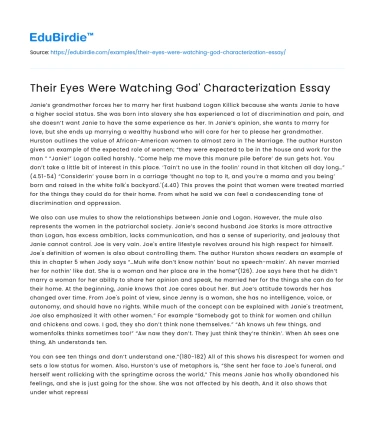Introduction
Zora Neale Hurston's novel, Their Eyes Were Watching God, stands as a pivotal work in African-American literature, renowned for its rich characterization and profound exploration of identity, empowerment, and self-realization. At the heart of the novel is Janie Crawford, a character whose journey towards self-discovery is both compelling and instructive. Hurston crafts her protagonist with such depth and nuance that Janie becomes a symbol of resilience and independence. Through Janie's interactions with other characters, particularly her three husbands, the novel delves into themes of autonomy, gender roles, and the search for genuine love. This essay examines how Hurston's characterization of Janie and the supporting characters contributes to these overarching themes, highlighting the intricate dynamics that define Janie's path to self-awareness.
The Evolution of Janie Crawford
Janie Crawford's character is central to the narrative, and her evolution is meticulously portrayed by Hurston. Initially introduced as a young girl with dreams shaped by her grandmother's aspirations, Janie's character is defined by her quest for a voice of her own. As noted by literary critic Cheryl A. Wall, Janie’s journey is marked by her struggle against societal and marital constraints. In her first marriage to Logan Killicks, Janie confronts the harsh reality of a loveless union imposed on her by her grandmother, Nanny. This relationship, characterized by its lack of emotional connection, serves as a catalyst for Janie's realization that her desires are incongruent with societal expectations. Hurston writes, "She was saving up feelings for some man she had never seen" (Hurston, 1937), illustrating Janie's yearning for a deeper connection.
Save your time!
We can take care of your essay
- Proper editing and formatting
- Free revision, title page, and bibliography
- Flexible prices and money-back guarantee
Janie's second marriage to Joe Starks offers a semblance of autonomy, as Joe presents himself as an ambitious man with dreams of power and wealth. However, this marriage soon reveals itself as another form of imprisonment. Joe's need for control stifles Janie's independence, as he dictates her appearance and speech. Despite the initial allure of Joe’s ambitions, Janie finds herself silenced and subjugated. The pivotal moment of Joe’s death marks the beginning of Janie's true liberation. Here, Hurston's characterization showcases Janie's transition from a life dictated by others to one led by her own choices. As scholar Robert E. Hemenway notes, Janie's journey is "a narrative of self-exploration and self-definition" (Hemenway, 1977).
Supporting Characters and Thematic Reinforcement
The supporting characters in Their Eyes Were Watching God play crucial roles in shaping Janie's journey and reinforcing the novel's themes. Janie's third husband, Tea Cake, is perhaps the most significant in her development. Unlike Logan and Joe, Tea Cake treats Janie as an equal, providing her with the freedom to express herself and explore her identity. Their relationship, characterized by mutual respect and companionship, represents Janie's ideal of love. Tea Cake's influence is pivotal in Janie's ultimate self-realization, as he embodies the possibility of a harmonious partnership. However, their relationship is not without its challenges, as Tea Cake's jealousy and eventual illness test Janie's strength and resolve.
The character of Nanny also serves as a counterpoint to Janie's aspirations. While Nanny's intentions are rooted in love and protection, her insistence on Janie's marriage to Logan reflects societal pressures and the limitations placed on women of her time. Nanny's worldview, shaped by her experiences of slavery and oppression, contrasts sharply with Janie's desire for autonomy and self-fulfillment. Through Nanny, Hurston examines the generational divide in perspectives on love and independence, highlighting the evolving nature of women's roles.
Additionally, the community of Eatonville acts as a backdrop against which Janie's personal growth unfolds. The townspeople, often serving as a chorus of societal judgment, reflect broader societal norms and expectations. Hurston uses these characters to emphasize the conflict between individual desires and communal pressures, further underscoring Janie's struggle for self-identity.
Conclusion
In Their Eyes Were Watching God, Zora Neale Hurston masterfully employs characterization to explore themes of identity, empowerment, and love. Through Janie Crawford's journey and her interactions with key supporting characters, the novel presents a nuanced portrayal of a woman's quest for self-discovery and autonomy. Hurston's depiction of Janie's evolution from a voiceless girl to an empowered woman resonates with readers, offering a profound commentary on the complexities of gender roles and societal expectations. By examining the interplay between Janie and the characters around her, Hurston not only crafts a compelling narrative but also invites reflection on the enduring struggle for self-definition and liberation. Ultimately, Janie's story is one of resilience and hope, a testament to the enduring power of the human spirit to overcome adversity and seek fulfillment.






 Stuck on your essay?
Stuck on your essay?

